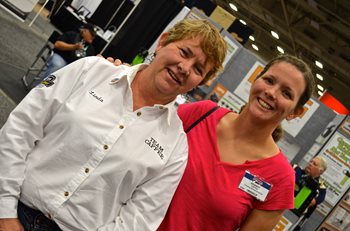 |
| Linda Caffee and her daughter at a truck show. |
If you are an owner-operator, traveling for your trucking business can be exhausting and traveling for pleasure can be expensive. Knowing the rules that affect tax deductibility can help you combine business with pleasure and maintain the tax deduction of your trip expenses.
Travel expenses are deductible when business needs require you to leave home for business or investment purposes as long as the expenses are ordinary and necessary. The cost of transportation, meals, gratuities, and lodging are examples of allowable deductions. Meals and entertainment are subject to a 50% limitation as a tax deduction. Expenses relating to the management of an investment are deductible. Keep in mind; the deduction for investment seminars and conventions (such as MATS or GATS) on a personal return has been eliminated. Additionally, travel as a form of education is not deductible.
When you have to travel for business you have a unique opportunity to wrap some leisure time in with your business travel and still deduct much of the cost of your trip. You can wrap personal days around business travel or vice versa. As long as the primary reason for the trip is business, transportation costs are deductible.
Transportation costs include airfare, train, taxis and shuttle costs. These costs are always deductible as long as the primary reason for the trip is a business purpose even if personal interests are pursued while on the trip. The key to deductibility is to be sure that your records support that the time spent was primarily spent conducting business.
What are the criteria for defining a trip as primarily business?
The IRS will look at the length of time spent conducting business versus time spent on personal endeavors. While there is not a hard and fast rule established by the IRS, one week working and three weeks playing would not pass the test. Traveling for a business meeting that lasts a couple of days and includes a couple of days leisure time however would. In the event you take a trip that is more personal than business you may still deduct auto mileage rental car for the days of the meeting, lodging the night before the meeting and subsequent night stays while still attending meetings. Meals are also deductible during that time frame subject to the 50% limitation on the meals.
There are ways to write off the entire cost of your trip if you can show that by extending your stay actually saved you money. The easiest way to accomplish this is to wrap in a Saturday night stay as this usually reduces airfare significantly. As long as the expenses for the personal days are less than the airfare savings achieved by lengthening your stay you can justify writing off all of the travel, meals and lodging. Expenses for your spouse or companion are not deductible including any additional charge for a double room. Purely personal items such as entertainment and cab fares over the weekend stay are also excluded.
Can your spouse’s expenses be deducted?
Travel costs for your spouse or companion generally are not deductible unless the spouse or companion is an employee of the firm. The cost may still be deductible however by the companion or spouse if they have a legitimate business purpose for their trip. In the situation where the companion or spouse is self-employed they may be able to conduct a legitimate business activity during the trip that would allow for them to take the deduction for their portion of the travel and related costs.
Who can be entertained and when is entertainment deductible?
Generally you can deduct the cost (subject to the 50% limitation) of entertaining customers, prospective customers, employees, agents, partners or professional advisors if your records are adequate.
How can you ensure that your entertainment expenses are legitimately deductible?
If you follow these simple rules you can ensure that your entertainment expenses are in fact legitimately deductible:
- If you are an owner-operator, traveling for your trucking business can be exhausting and traveling for pleasure can be expensive. Knowing the rules that affect tax deductibility can help you combine business with pleasure and maintain the tax deduction of your trip expenses.entertainment expenses are “directly related” to the taxpayers trade or business—meaning, they occurred in a business setting.
- The expenses are “associated with” the taxpayers trade or business—meaning, the entertainment was preceded or followed by a bona fide business discussion that occurred on the same day as the entertainment.
- The taxpayer had more than a general expectation of deriving income or other specific benefit from the activity.
- The taxpayer engaged in business during the entertainment period.
- The principal aspect of combined business and entertainment was business.
Can company drivers write off travel costs?
If you are not reimbursed by your employer for your travel costs you can deduct meals subject to the 50% and the remaining travel expenses will be subject to 2% of your AGI.
What records do you need to keep supporting your tax deductions for travel and entertainment?
In order to maintain and support the deductibility of travel costs you must maintain adequate records:
- Travel records must detail the amount of each separate expenditure
- Notate the dates of the trip and the number of days spent on business
- Notate all travel destinations
- Substantiate the business reasons for the travel
In addition, entertainment deductions must also be supported with adequate records:
- Detail of each separate expenditure
- Date of entertainment
- Location and type of entertainment
- Business purpose of entertainment
- Names and occupations of individuals being entertained, showing the business relationship
These general guidelines can help most taxpayers determine the deductibility of travel expenses. If these guidelines do not address your unique situation, contact your tax professional to get more specific advice.